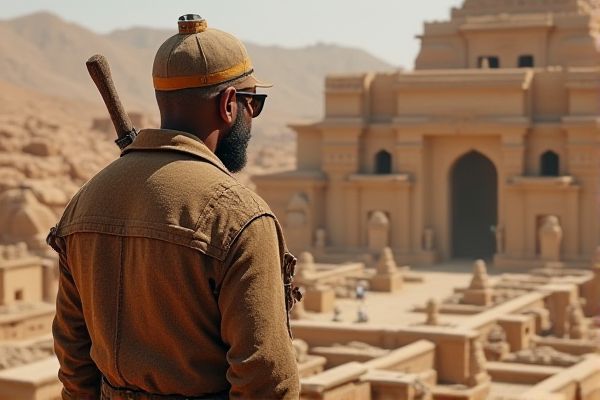
Archaeologist job opportunities in India are varied and can be found within government departments, private organizations, museums, and research institutions. The Archaeological Survey of India (ASI) regularly recruits professionals for fieldwork, research, and conservation projects related to historical sites. In addition to academic qualifications, practical experience in excavation, artifact analysis, and preservation techniques is highly valued. Freelance roles and project-based contracts are also available, offering flexibility and diverse experiences in various archaeological contexts across the country.
Job Description
Archaeologist jobs in India involve the study and excavation of historical sites, artifacts, and ancient cultures to enhance understanding of India's rich heritage. Professionals in this field often conduct field surveys, analyze findings in laboratories, and publish research to contribute to the academic community. Strong knowledge of geological and cultural history is essential, alongside competencies in analytical techniques and fieldwork methodologies. Opportunities exist in both governmental agencies and private organizations, offering a chance for you to be part of preserving India's archaeological legacy.
Requirement
Archaeologist jobs in India require a strong educational background, typically a degree in archaeology, anthropology, or a related field. Field experience through internships or volunteer work is highly valued, as it provides practical skills in excavation and research techniques. Proficiency in regional languages and knowledge of India's diverse cultural heritage can enhance your employability in this sector. Familiarity with modern technologies, such as GIS and remote sensing, is increasingly important for data analysis and documentation in archaeological projects.
Salary and Perks Expected
Archaeologist jobs in India offer competitive salaries that typically range from INR 3 lakh to 8 lakh per annum, depending on experience and qualifications. Entry-level positions may provide lower salary packages, while seasoned professionals with specialized skills can command higher compensation and opportunities for advancement. Many organizations also offer perks such as field allowances, health insurance, and opportunities for travel, enhancing the overall job satisfaction. With a growing interest in cultural heritage and conservation, pursuing a career in archaeology can be rewarding both personally and financially in the Indian context.
Similar Job Names
- Field Archaeologist
- Research Archaeologist
- Cultural Resource Manager
- Archaeological Technician
- Heritage Consultant
- Museum Curator
- Excavation Team Leader
- Conservation Scientist
- Archaeological Project Manager
- Academic Researcher
- Ethnoarchaeologist
- Paleoanthropologist
- Archaeobotanist
- Geophysical Survey Specialist
- Maritime Archaeologist
Job Expectation Concept
Archaeologists in India are responsible for conducting research and excavations that uncover historical artifacts and structures, contributing significantly to the understanding of the country's rich heritage. Your role may involve fieldwork, laboratory analysis, and the documentation of findings, often requiring collaboration with government bodies, universities, and museums. A strong educational background in archaeology, anthropology, or related fields is essential, along with skills in critical thinking and problem-solving. The job may also demand adherence to ethical standards and preservation practices, ensuring that excavated sites and materials are protected for future generations.
Career Advantage and Weakness
Archaeologist jobs in India offer a unique opportunity to explore the country's rich historical heritage, making significant contributions to understanding ancient cultures. You can work on exciting projects ranging from excavation sites to museum curation, allowing for both fieldwork and academic research. However, the profession often faces funding challenges and limited job availability, which can impact career growth and stability. Gaining advanced degrees and specialized skills can enhance your prospects in this competitive field, making it essential to stay informed about developments in archaeology and heritage management.
Important Thing Must Know
Archaeologist jobs in India often emphasize the importance of cultural heritage and historical preservation. Opportunities exist within various sectors, including government agencies, universities, and private organizations. A strong educational background in archaeology or related fields, coupled with field experience, is essential for aspiring professionals. Understanding of local regulations and international guidelines for archaeological practices can greatly enhance your employability. The field offers diverse roles, from excavation and research to conservation and education, reflecting India's rich and varied history.
Alternative Career Options
Archaeologists in India can explore diverse career options beyond traditional excavation roles. Opportunities exist in cultural resource management, where you can work with organizations that preserve heritage sites and artifacts. Teaching archaeology at universities or colleges offers a chance to share knowledge and inspire future generations. Additionally, roles in museums or heritage conservation organizations allow for the curation of exhibitions and educational programs that promote awareness of India's rich archaeological history.
Companies List
- Archaeological Survey of India (ASI)
- Indian National Trust for Art and Cultural Heritage (INTACH)
- Indian Institute of Archaeology
- Archaeology and Heritage Management firms
- Museums and cultural institutions
- Universities with archaeology programs
- Environmental consultancy firms
- Non-governmental organizations focused on heritage conservation
- Cultural resource management companies
- Heritage tourism companies
List of Ideal City
India offers several cities that are ideal for archaeologist jobs, with rich historical backgrounds and vibrant archaeological activities. Delhi stands out with its myriad of ancient sites and ongoing excavation projects, providing ample opportunities for professionals in the field. Jaipur, known for its historical forts and palaces, also hosts archaeological research institutes and encourages explorations in the region. In Andhra Pradesh, the city of Amaravati is significant for its ancient Buddhist ruins, attracting both researchers and enthusiasts eager to uncover the past.
 jobs-india.net
jobs-india.net